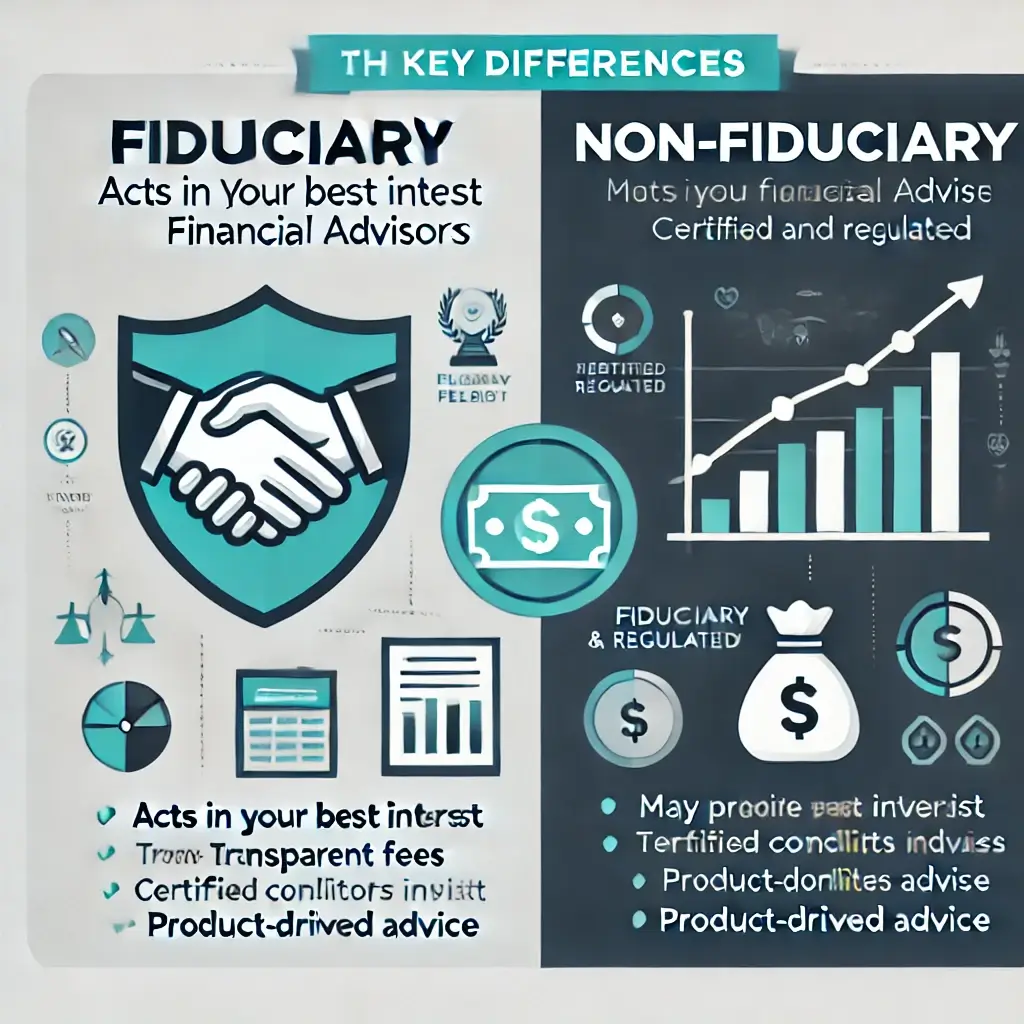Managing your finances can be overwhelming, especially when you’re juggling multiple goals like saving for retirement, buying a home, or paying off debt. A financial advisor can help you navigate these challenges and create a roadmap to achieve your financial goals. But with so many types of advisors and services available, how do you know which one is right for you? In this comprehensive guide, we’ll explore the benefits of working with a financial advisor, the different types of advisors, and how to choose the best one for your needs.

What Is a Financial Advisor?
A financial advisor is a professional who provides guidance on managing your money, investments, and overall financial plan. They help you make informed decisions about saving, investing, budgeting, and planning for the future. Whether you’re just starting out or preparing for retirement, a financial advisor can offer personalized advice tailored to your unique situation.
If you’re new to financial planning, check out our ultimate guide to financial planning for beginners to get started.
Benefits of Working with a Financial Advisor
Hiring a financial advisor offers numerous advantages, including:
1. Expertise and Knowledge
Financial advisors are trained professionals with in-depth knowledge of financial markets, tax laws, and investment strategies. They can help you make informed decisions and avoid costly mistakes.
2. Personalized Financial Planning
Advisors create customized plans based on your goals, risk tolerance, and financial situation. Whether you’re saving for a child’s education or planning for retirement, they’ll tailor their advice to meet your needs.
3. Time Savings
Managing your finances can be time-consuming. A financial advisor handles the heavy lifting, allowing you to focus on other priorities.
4. Objective Advice
Emotions can cloud financial decisions. Advisors provide unbiased, objective advice to help you stay on track and avoid impulsive choices.
5. Long-Term Wealth Building
Advisors help you develop strategies to grow wealth over time, ensuring you’re prepared for major life events like retirement or buying a home.
6. Tax Optimization
A good advisor can help you minimize your tax liability through strategic planning and investment choices.
7. Peace of Mind
Knowing your finances are in capable hands can reduce stress and give you confidence in your financial future.
A financial advisor can help you set and achieve SMART financial goals for long-term success.

Types of Financial Advisors
Not all financial advisors are the same. Here are the main types and what they offer:
1. Certified Financial Planners (CFPs)
CFPs are highly qualified professionals who have completed rigorous training and passed a comprehensive exam. They provide holistic financial planning, including retirement, estate planning, and tax strategies. For a deeper dive into retirement planning, explore our comprehensive retirement planning guide.
2. Registered Investment Advisors (RIAs)
RIAs are fiduciaries, meaning they must act in your best interest. They typically charge a fee based on assets under management (AUM) and focus on investment management.
3. Robo-Advisors
Robo-advisors are automated platforms that use algorithms to manage your investments. They’re cost-effective and ideal for beginners or those with straightforward financial needs.
4. Brokers
Brokers buy and sell securities on your behalf. They earn commissions on transactions, which can create potential conflicts of interest.
5. Insurance Agents
These advisors specialize in insurance products like life, health, and long-term care insurance. They can help you protect your assets and loved ones.
6. Tax Advisors
Tax advisors focus on minimizing your tax liability through strategic planning and filing. They often work alongside other financial professionals.
7. Estate Planning Attorneys
These professionals help you create wills, trusts, and other legal documents to protect your assets and ensure your wishes are carried out.
How to Choose the Right Financial Advisor
Choosing the right financial advisor is a critical decision. Here’s a step-by-step guide to help you make the best choice:
1. Identify Your Needs
Before hiring an advisor, determine what you need help with. Are you looking for investment management, retirement planning, or tax advice? Knowing your goals will help you find the right specialist.
2. Check Credentials
Look for advisors with reputable certifications like CFP, CFA (Chartered Financial Analyst), or CPA (Certified Public Accountant). These designations indicate a high level of expertise and ethical standards.
3. Understand Their Fee Structure
Financial advisors are paid in different ways:
- Fee-Only: Charges a flat fee, hourly rate, or percentage of AUM. No commissions.
- Fee-Based: Charges fees but may also earn commissions on products they sell.
- Commission-Based: Earns money from selling financial products, which can create conflicts of interest.
Fee-only advisors are often preferred because they have fewer conflicts of interest.
4. Verify Their Fiduciary Status
A fiduciary is legally required to act in your best interest. Always choose a fiduciary advisor to ensure unbiased advice.
5. Ask About Their Experience
Find out how long they’ve been in business and whether they have experience working with clients in similar situations.
6. Review Their Services
Ensure the advisor offers the services you need, whether it’s retirement planning, tax optimization, or estate planning.
7. Check References and Reviews
Ask for references from current clients and read online reviews to gauge their reputation and client satisfaction.
8. Interview Multiple Advisors
Don’t settle for the first advisor you meet. Interview at least three candidates to compare their services, fees, and approaches.
9. Trust Your Instincts
Choose an advisor you feel comfortable with and trust. A good advisor should listen to your concerns, communicate clearly, and align with your values.
NerdWallet offers a detailed guide on choosing the right financial advisor for your needs.
Questions to Ask a Financial Advisor
When interviewing potential advisors, ask these questions to ensure they’re the right fit:
- What are your qualifications and certifications?
- Are you a fiduciary?
- How do you charge for your services?
- What services do you offer?
- What is your investment philosophy?
- How often will we meet or communicate?
- Can you provide references from current clients?
- How do you handle conflicts of interest?
- What is your approach to risk management?
- Do you have experience working with clients like me?
Red Flags to Watch Out For
Not all financial advisors have your best interests at heart. Here are some warning signs to avoid:
- Pressure to Buy Specific Products: Be wary of advisors who push certain investments or insurance policies without explaining how they benefit you.
- Lack of Transparency: If they’re vague about fees or services, it’s a red flag.
- No Fiduciary Duty: Advisors who aren’t fiduciaries may prioritize their commissions over your needs.
- Poor Communication: If they don’t respond promptly or explain things clearly, they may not be the right fit.
- Unrealistic Promises: Be cautious of advisors who guarantee high returns or claim to have a “secret strategy.”
How Much Does a Financial Advisor Cost?
The cost of hiring a financial advisor varies depending on their services and fee structure. Here’s a breakdown of typical costs:
- Fee-Only Advisors: Charge 1% of AUM annually or a flat fee ranging from 1,000to1,000to3,000.
- Hourly Rates: Range from 150to150to400 per hour.
- Robo-Advisors: Charge 0.25% to 0.50% of AUM annually.
- Commission-Based Advisors: Earn commissions on products they sell, which can vary widely.
DIY vs. Hiring a Financial Advisor
While some people prefer to manage their finances on their own, others benefit from professional guidance. Here’s a comparison:
DIY
- Pros: Saves money on fees; full control over decisions.
- Cons: Requires time and expertise; higher risk of mistakes.
Hiring a Financial Advisor
- Pros: Access to expertise; personalized advice; time savings.
- Cons: Costs money; requires trust in the advisor.
Final Thoughts
A financial advisor can be a valuable partner in achieving your financial goals. By understanding the benefits, types, and how to choose the right advisor, you can make an informed decision that sets you up for long-term success.
Improving your credit score is a key step in financial health—learn how with our credit score guide.
Ready to take control of your finances? Start by identifying your needs, researching advisors, and scheduling consultations. With the right advisor by your side, you can build a secure financial future. Learn how to build a financial roadmap to achieve your goals.
FAQs
1. Do I need a financial advisor if I have a small portfolio?
Even with a small portfolio, a financial advisor can help you create a plan to grow your wealth and achieve your goals.
2. How often should I meet with my financial advisor?
Most advisors recommend meeting at least once a year, but you may need more frequent check-ins during major life changes.
3. Can I switch financial advisors if I’m not satisfied?
Yes, you can switch advisors at any time. Just ensure there’s no gap in your financial planning.
4. What’s the difference between a financial advisor and a financial planner?
A financial planner focuses on creating a comprehensive financial plan, while a financial advisor may specialize in investments or other areas.
5. Are robo-advisors a good alternative to human advisors?
Robo-advisors are cost-effective and ideal for beginners, but they lack the personalized touch of a human advisor.
By following this guide, you’ll be well-equipped to choose the right financial advisor and take control of your financial future. Let me know if you need further assistance!

